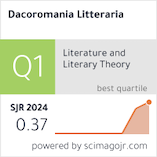Laura Marin
COMMENT LE NEUTRE MOBILISE-T-IL LA COLÈRE ?
DOI: https://doi.org/10.33993/dlr.2018.5.24.32
Author's coordinates: University of Bucharest, 5-7 Edgar Quinet Str., sector 1, Bucharest, Romania
Email: laurammarin@gmail.com
HOW DOES THE NEUTRAL ACTIVATE ANGER?
(Abstract)
Anger is one of the figures that instantiate the category of the Neutral, as described in the lecture course offered by Roland Barthes at Collège de France in 1977–1978. At a first glance, relating a concept that has emerged from structural linguistics with a fundamental affect (not only from a psychological perspective but also from a cultural one) may seem a surprising approach. This surprising connection makes precisely the object of my interest here, especially because of its outcomes: firstly, it introduces the Neutral in the vocabulary of affects, and secondly, it places a special emphasis on the transformative capacity of affects. An analytic reading of the figure of anger allows me to investigate, within the framework of this article, the way in which Barthes divides the affect, oscillating between anger as a psychological phenomenon and anger as a value, or an evaluation. Thus, he initiates the thinking of an ethical problem: the Neutral becomes a life guide, a principle to live by, a (desirable) lifestyle, and not only a discourse operator.
Keywords: Barthes, the Neutral, pathos, anger, attention.
CUM ACTIVEAZĂ NEUTRUL FURIA?
(Rezumat)
Printre figurile care declină categoria Neutrului
în cursul pe care Roland Barthes îl susține la
Collège de France în 1977–1978 regăsim și „furia”.
Această apropiere între o categorie a lingvisticii
structurale la bază și o emoție fundamentală
nu doar din perspectivă psihologică, ci și culturală,
ne poate surprinde. Ea mă interesează aici tocmai
prin efectele pe care le produce: pe de o parte,
introduce neutrul în vocabularul afectelor, pe
de altă parte, valorizează capacitatea transformativă
a emoțiilor. O lectură analitică a figurii furiei
îmi permite în acest articol să observ modul
în care Barthes divide emoția, oscilând între
furia ca fenomen psihic și furia ca valoare,
ca evaluare. El face astfel loc unei probleme
de natură etică: neutrul devine un ghid de viață,
un mod de a trăi, un stil (dezirabil) de viață,
nu doar un operator de discurs.
Cuvinte-cheie: Barthes, neutru, pathos, furie, atenție.


